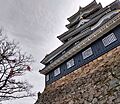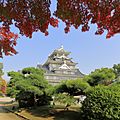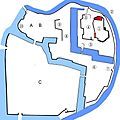Okayama Castle facts for kids
Quick facts for kids Okayama Castle岡山城 |
|
|---|---|
| Okayama, Okayama Prefecture, Japan | |
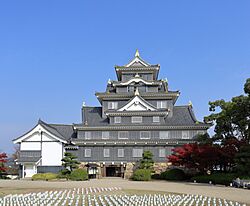
Donjon Tower
|
|
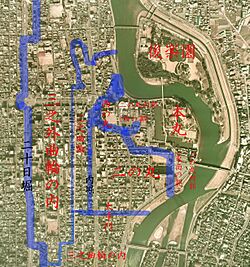
An aerial view of Okayama Castle
|
|
| Type | Azuchi-Momoyama castle |
| Site information | |
| Controlled by | Nawa clan (1346-unknown) Kanamitu clan (1521-1528) Ukita clan (1570-1600) Kobayakawa clan (1600-1602) Ikeda clan (1602-1869) Japan (1869-present) |
| Condition | Surviving turrets and stone walls, concrete replica keep (1966) |
| Site history | |
| Built | 1346-1369 (Nawa clan) rebuilt 1590-1597 (Ukita Hideie) replica donjon completed 1966 |
| In use | 1346-1889 |
| Materials | Wood, stone, plaster, tile. |
| Demolished | Moats: Ministry of War (1873-82), Main tower: US air raid (Jun 29, 1945) |
| Battles/wars | Contributed to Sekigahara (total loss) |
Okayama Castle (岡山城, Okayama-jō) is a famous Japanese castle located in the city of Okayama, Japan. Its main tower was finished in 1597. Sadly, it was destroyed during World War II in 1945. A new, strong concrete version was built in 1966.
Two of the castle's watchtowers survived the bombing. These old towers are now very important. Japan's Agency for Cultural Affairs lists them as Important Cultural Properties.
Okayama Castle looks very different from the white "Egret Castle" nearby. Okayama Castle has a striking black outside. This dark color gave it the nickname Crow Castle (烏城, U-jō). It's like a "castle of the black bird."
Long ago, before a big battle called Sekigahara, the main tower had shiny gold roof tiles. Because of these golden tiles, it was also known as Golden Crow Castle (金烏城, Kin U-jō). Today, only a few parts of the roof, like the fish-shaped decorations called shachihoko, are still gilded.
Contents
History of Okayama Castle
Building the Castle
The story of Okayama Castle began in 1570. A powerful leader named Ukita Naoie took control of the castle. He started to rebuild and improve it. His son, Ukita Hideie, finished the work in 1597.
Changes in Ownership
Just three years later, Hideie joined the Toyotomi Clan in the Battle of Sekigahara. This was a huge battle that the Toyotomi clan lost. Hideie was captured by the Tokugawa Clan. He was then sent away to live on a faraway island called Hachijo.
After the battle, the castle and its lands were given to Kobayakawa Hideaki. This was a reward for his help in the war. But Kobayakawa died only two years later. He did not have any children to take over. So, the castle was then given to the Ikeda Clan. The Ikeda family later built the beautiful Kōraku-en garden next to the castle. This garden was their private space.
Modern Times and Reconstruction
In 1869, the castle became the property of the Japanese government. The government's Hyōbu-shō (Ministry of War) thought old samurai castles were no longer needed. Many castles across Japan were changed or taken apart. Okayama Castle's outer moats (water ditches) were filled in. Most of its buildings were removed. The old castle walls slowly disappeared under the growing city.
On June 29, 1945, during World War II, planes from the Allied forces bombed the castle. The main tower and a nearby gate were completely burned down. Only two watchtowers and some stone walls were left standing.
Work to rebuild the main tower and gate started in 1964. It was finished in 1966. In 1996, the rooftop decorations were covered in gold again. This was part of the castle's 400th anniversary celebration.
Visiting the Castle Today
The main tower you see today is a modern building. It has air-conditioning and elevators. Inside, you can find many displays about the castle's history. These displays focus a lot on the Ikeda family's time there. Most of the information is in Japanese. You can visit the inner part of the castle for free.
Images for kids
See also
 In Spanish: Castillo Okayama para niños
In Spanish: Castillo Okayama para niños
- Okayama Kōraku Gardens
- Inryoji Temple


